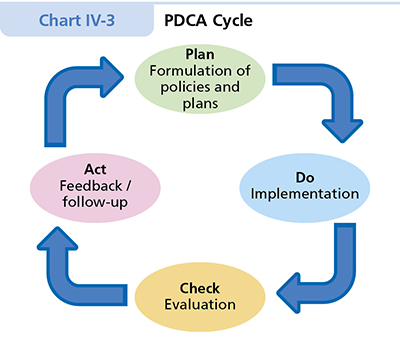(3) Enhancing Management and Ensuring Accountability of ODA
In order to enhance management and ensure the accountability of ODA, Japan has taken the following measures: (i) enhancing the PDCA cycle (project formation (Plan), implementation (Do), evaluation (Check), follow-up activities (Act)), (ii) strengthening program approaches, and (iii) reinforcing “visualization.”
With regard to enhancing the PDCA cycle, the ongoing efforts include: (i) formulating Country Development Cooperation Policies for all recipient countries of Japan’s ODA, (ii) convening the Development Project Accountability Committee, (iii) setting indicators for each project, and (iv) strengthening the evaluation mechanism.
In order to implement ODA projects more effectively and efficiently, strengthening of the PDCA cycle not only at the project level but also at the policy level is required. To this end, MOFA conducts policy evaluations of economic cooperation policies based on the “Government Policy Evaluations Act (GPEA)” Note 25 as well as ODA evaluations by third parties in order to ensure objectivity and fairness. The recommendations and lessons obtained from these evaluations are reflected in ODA policy to further improve ODA management. Note 26
The ODA evaluations by third parties are conducted both from “development viewpoints,” which determine whether ODA is contributing to the recipient country’s development, and from “diplomatic viewpoints,” which determine what favorable impacts ODA has on Japan’s national interests.
Evaluations from “development viewpoints” are conducted based on three evaluation criteria, namely, whether the ODA policies are consistent with Japan’s high-level policies, global priority issues, and the needs of the recipient countries (Relevance of Policies), what effects Japan’s ODA has in practice (Effectiveness of Results), and whether appropriate processes had been taken to ensure the Relevance of Policies and Effectiveness of Results (Appropriateness of Processes). Evaluations from “diplomatic viewpoints” are conducted based on two criteria: how ODA is expected to contribute to Japan’s national interests (Diplomatic Importance) and how ODA has contributed to the realization of Japan’s national interests (Diplomatic Impact).
In view of the plan to formulate a new Development Cooperation Charter during the first half of 2023, MOFA conducted the “Review of Japan’s ODA Evaluations from FY2015 to FY2021” in 2022 by reviewing past ODA evaluation reports in line with the main items of the Development Cooperation Charter, with the aim of providing recommendations for future ODA policies, issues to be considered for their implementation, and new perspectives to be included.
MOFA publishes the evaluation results on its website Note 27 to fulfill public accountability and to gain public understanding and support for ODA by enhancing the transparency of ODA.
JICA also conducts evaluations on respective projects of grant aid, loan aid, and technical cooperation, as well as thematic evaluations. JICA conducts consistent ex-ante, implementation, and ex-post evaluation for each project and establishes a coherent evaluation mechanism for each of these aid modalities. As for projects that exceed a certain amount, JICA conducts ex-post evaluations by third-party evaluators. JICA also strives to enhance impact evaluations, Note 28 recognizing the importance of quantitative examination of the effects of their projects.
The ODA evaluations conducted by MOFA and JICA are primarily based on the Evaluation Criteria of the Development Assistance Committee (DAC) of the Organisation for Economic Cooperation and Development (OECD). Note 29

- Note 25: Other than at the policy level, ex-ante evaluations are conducted on loan aid projects in which the maximum amount of loan offered through an Exchange of Notes (E/N) is 15 billion yen or more and on grant aid projects in which the maximum amount of aid offered through an E/N is 1 billion yen or more. In addition, ex-post evaluations are conducted on “pending projects” and “incomplete projects.” (“Pending projects” are projects for which the loan agreement has not been signed or loan disbursement has not begun after five years have elapsed following the decision to implement the project, etc. “Incomplete projects” are projects for which loan disbursements have not been completed after 10 years have elapsed following the decision to implement the project, etc.)
- Note 26: In addition to policy-level ODA evaluations (third-party evaluations), regarding grant aid implemented by MOFA, internal evaluations are carried out for projects in which the maximum amount of aid offered through an E/N is 200 million yen or more, and third-party evaluations are carried out for projects of 1 billion yen or more since FY2017. The results of these evaluations are publicized and utilized to improve the formation of future ODA projects.
- Note 27: https://www.mofa.go.jp/policy/oda/evaluation/index.html
- Note 28: Evaluation method verifying the effects of development projects by using methods from statistics and econometrics.
- Note 29: DAC evaluation criteria: In December 2019, coherence was added to the criteria of relevance, effectiveness, efficiency, impact, and sustainability that had been in use since 1991.
